Episode 6:
The role of pricing and procurement with Catia Fernandes
See all episodes
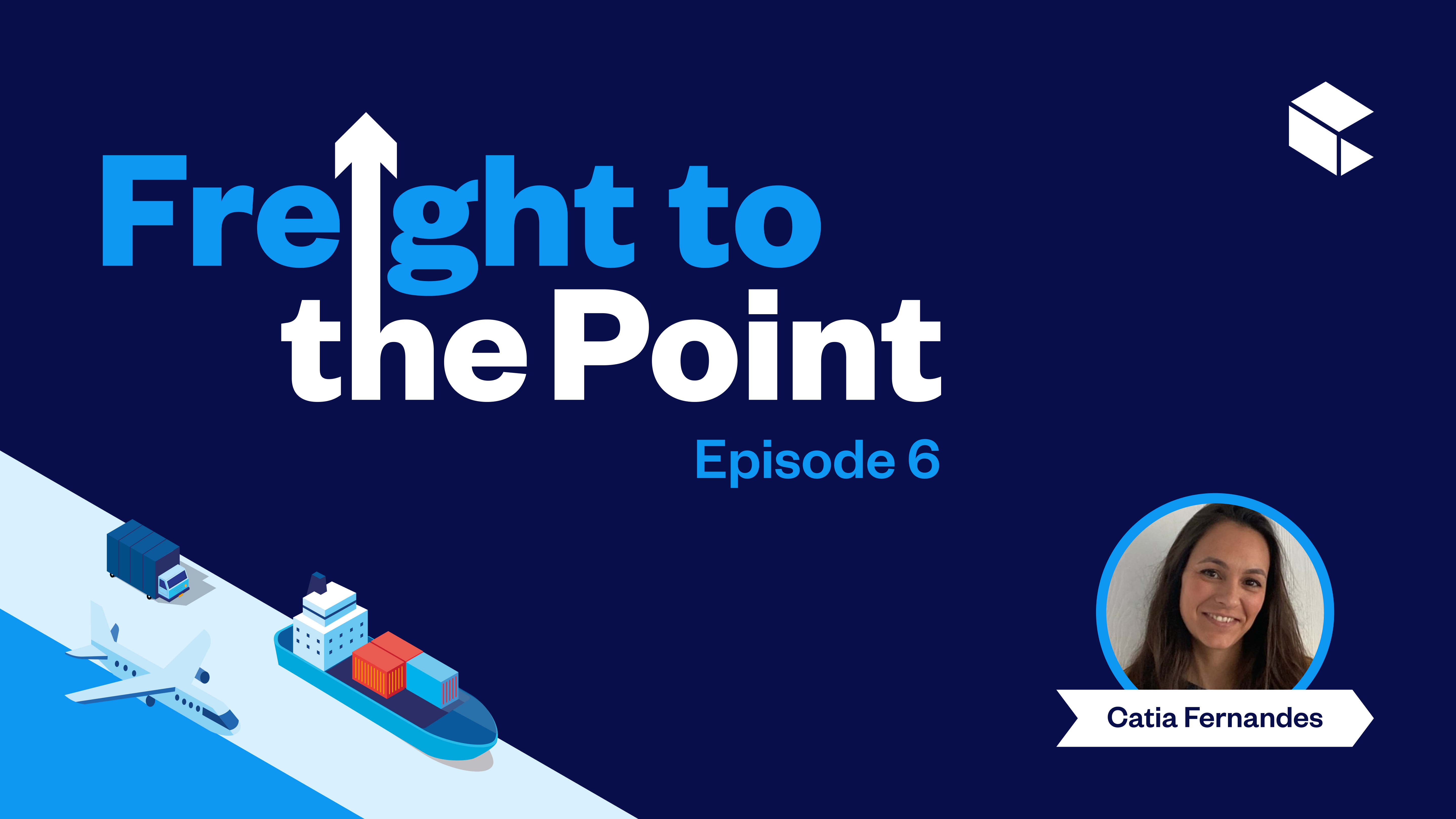
On this week’s episode on ‘Freight to the Point’, we invited Catia Fernandes, Head of Trade (Far East – UK) to talk about how she started in the supply chain industry through a graduate programme with Maersk, all the way to her role in the pricing and procurement team at Zencargo.
This episode explores:
- The complexities of making the best decisions for the customer
- How Zencargo reacted to space shortages on carriers last year
- The carrier alliances formed before the pandemic
Catia Fernandes
Catia Fernandes is the Head of Trade (Far East – UK) at Zencargo. Since starting at Maersk in 2005, Catia has worked in the supply chain space for over 15 years. At Zencargo, Catia is part of the pricing and procurement team, who develop relationships with carriers to help customers find the best rates and space for their shipments.
Listen to the next episode now
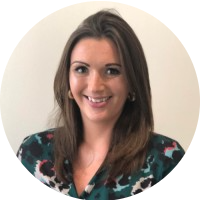 Hello, and welcome to episode six of Freight to the Point, a podcast by Zencargo. I’m Helena Wood, and today I am joined by Catia Fernandes, the Head of Trade Lanes in the ocean team at Zencargo. We’re so thrilled to have her here. Today, we’re going to be learning about Catia’s origins, her experience in the ocean industry, and how she envisages change in the supply chain. Welcome, Catia.
Hello, and welcome to episode six of Freight to the Point, a podcast by Zencargo. I’m Helena Wood, and today I am joined by Catia Fernandes, the Head of Trade Lanes in the ocean team at Zencargo. We’re so thrilled to have her here. Today, we’re going to be learning about Catia’s origins, her experience in the ocean industry, and how she envisages change in the supply chain. Welcome, Catia.
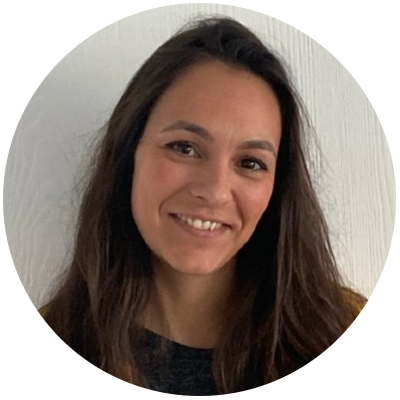
 Right. Let’s get freight to the point. Why ocean? Tell us a little bit about how you started out in supply chain, Catia.
Right. Let’s get freight to the point. Why ocean? Tell us a little bit about how you started out in supply chain, Catia.

 We’re big fans of Lars Jensen here at Zencargo.
We’re big fans of Lars Jensen here at Zencargo.

 Gosh, amazing. It’s interesting, because you’re the second person who we’ve spoken to on this podcast. Laura Odell, who looks after air at Zencargo, had a similar route. She came in through an apprenticeship, so slightly less structured learning, but obviously that kind of graduate scheme and the structure of being able to get a really good taste for the industry sounds like such a good entry point.
Gosh, amazing. It’s interesting, because you’re the second person who we’ve spoken to on this podcast. Laura Odell, who looks after air at Zencargo, had a similar route. She came in through an apprenticeship, so slightly less structured learning, but obviously that kind of graduate scheme and the structure of being able to get a really good taste for the industry sounds like such a good entry point.

 So how many other people were on the graduate program with you?
So how many other people were on the graduate program with you?

 Gosh, that must have been fascinating. Have you kept in touch with anyone from your intake?
Gosh, that must have been fascinating. Have you kept in touch with anyone from your intake?

 Nice. And you must have had some fun together while you were on that grad scheme.
Nice. And you must have had some fun together while you were on that grad scheme.

 Feels all a bit secretive. It’s almost like something I don’t know about. So I’m going to leave it with you and anyone else who knows.
Feels all a bit secretive. It’s almost like something I don’t know about. So I’m going to leave it with you and anyone else who knows.

 Any top stories from your experience you can tell us?
Any top stories from your experience you can tell us?

 Gosh, an amazing sort of real life experience.
Gosh, an amazing sort of real life experience.

 And obviously Catia, you said you held lots of different positions during your time at Maersk. So what was it that sort of pointed you in the direction of working through the pricing and procurement route?
And obviously Catia, you said you held lots of different positions during your time at Maersk. So what was it that sort of pointed you in the direction of working through the pricing and procurement route?

 Yeah. I can only imagine. I mean, you’re so right. Here at Zencargo, we couldn’t do almost anything of what we do without working so closely with you and your peers in that pricing and procurement team who are working directly with the carriers and sort of sorting out the space in rates. Do you mind, for anyone who’s on the podcast who maybe doesn’t really understand what it is that you actually do at Zencargo, Catia, could you give us a sort of idiot’s guide to the team and your role?
Yeah. I can only imagine. I mean, you’re so right. Here at Zencargo, we couldn’t do almost anything of what we do without working so closely with you and your peers in that pricing and procurement team who are working directly with the carriers and sort of sorting out the space in rates. Do you mind, for anyone who’s on the podcast who maybe doesn’t really understand what it is that you actually do at Zencargo, Catia, could you give us a sort of idiot’s guide to the team and your role?

 And it’s interesting, because you mentioned a few things there, which I think are so important to unpack, for the first of which is it’s become so clear to me over my time at Zencargo working with you and your team, just how focused you are on the customer at the heart of all of that, because of course securing the rate, securing the space is only one thing, but making sure that we are able to actually deliver our customer outcomes. You, for example, spoke about dwell times and really ensuring that we minimise dwell for our customers. Can you tell us a bit more about the complexity of making decisions and building relationships when you’re focused on not only the cheapest rate or the best guarantee of space, but really of making sure it’s the best match for the customer?
And it’s interesting, because you mentioned a few things there, which I think are so important to unpack, for the first of which is it’s become so clear to me over my time at Zencargo working with you and your team, just how focused you are on the customer at the heart of all of that, because of course securing the rate, securing the space is only one thing, but making sure that we are able to actually deliver our customer outcomes. You, for example, spoke about dwell times and really ensuring that we minimise dwell for our customers. Can you tell us a bit more about the complexity of making decisions and building relationships when you’re focused on not only the cheapest rate or the best guarantee of space, but really of making sure it’s the best match for the customer?

 And I suppose, also, it’s interesting because you talk about relationships. You talk about trust. You talk about customer centricity, but you also started all of this by saying it’s a very complex job. And I can only imagine that, actually, for you and your role and for your team, the way in which Zencargo works and thinks about all of these outcomes, it calls on so much expertise. So can you tell us, I suppose, for you, for the team that you work with, what are the skill sets that helps someone do that really well?
And I suppose, also, it’s interesting because you talk about relationships. You talk about trust. You talk about customer centricity, but you also started all of this by saying it’s a very complex job. And I can only imagine that, actually, for you and your role and for your team, the way in which Zencargo works and thinks about all of these outcomes, it calls on so much expertise. So can you tell us, I suppose, for you, for the team that you work with, what are the skill sets that helps someone do that really well?

 And I’m sure if I were to put my marketing hat on, I would tell you that it wouldn’t be possible to be switched on and proactive if you didn’t have good data and good visibility and good forecasting, enabling you to make those decisions. And I suppose, also, we’ve not spoken about this much on the podcast, but Zencargo, one of the things that we love in working with our team is we are a values-driven organisation. So one of the values that we all share and we look for in anyone that joins our team is that we hope they’re going to be outcome-oriented. And I suppose something for you in being proactive and switched on is always having that outcome and the kind of in your sites, and making sure that you’re doing whatever you can to achieve that outcome for the business, but also really for our customers.
And I’m sure if I were to put my marketing hat on, I would tell you that it wouldn’t be possible to be switched on and proactive if you didn’t have good data and good visibility and good forecasting, enabling you to make those decisions. And I suppose, also, we’ve not spoken about this much on the podcast, but Zencargo, one of the things that we love in working with our team is we are a values-driven organisation. So one of the values that we all share and we look for in anyone that joins our team is that we hope they’re going to be outcome-oriented. And I suppose something for you in being proactive and switched on is always having that outcome and the kind of in your sites, and making sure that you’re doing whatever you can to achieve that outcome for the business, but also really for our customers.

 And let’s take a little bit of a turn, Catia. We have a question that we ask everyone who comes onto this podcast, and it’s to tell us about a ship happens moment in their career. So can you tell us, if you’ve got a story that you tell friends at dinner parties, or that’s particularly memorable, when ship happened in your career?
And let’s take a little bit of a turn, Catia. We have a question that we ask everyone who comes onto this podcast, and it’s to tell us about a ship happens moment in their career. So can you tell us, if you’ve got a story that you tell friends at dinner parties, or that’s particularly memorable, when ship happened in your career?
Oh, yes. Actually, this one was in a local carrier that I used to work for in Portugal. And we decided that we wanted to expand our business in Africa, which we had already some presence, but we wanted to create some competitive advantage in different ports that were not being used by other carriers. So we went and explored, onsite, those locations. Well, I can tell you that Africa’s not very well connected in terms of flights, especially if it’s in intra-country like intra-Africa. So we decided to travel by car, which it was a very different experience. So we crossed the border between Gambia to Senegal, and between Senegal to Guinea-Bissau. And I can tell you I’ve never seen a reality like that, where we are expecting things to work kind of in a similar way as Europe, or even when I worked in South America, but Africa is a totally different thing.
I mean, you do business… Like we were having discussions with partners where they didn’t have an office on a port. They had a motorbike and an iPad. That was their office, and they managed business, and business flourished. And I was astonished to see how little they have and how much they can do. And I always remember that, because it was a huge learning, that you can actually do business in the most basic conditions as I’ve seen there. And going through all of the different borders and not knowing what was going to happen and feeling that, oh, I might get into trouble here. But we actually were very well received across the different borders, never had any issues. And when we explained what we were doing, people were very welcoming. So I think that was my moment I would always raise as something that was unique, for sure.

 I was going to say, that sounds like a very positive experience. Usually when someone tells us their ship happens experience, it might be something that’s gone wrong that they’ve had to overcome, but that sounds like actually taking some challenging circumstances and really thriving in them. And great that it was such a learning experience and so eye opening, as well.
I was going to say, that sounds like a very positive experience. Usually when someone tells us their ship happens experience, it might be something that’s gone wrong that they’ve had to overcome, but that sounds like actually taking some challenging circumstances and really thriving in them. And great that it was such a learning experience and so eye opening, as well.

 I’m sure stuff has gone wrong, though. Give me a ship happens moment where something’s actually gone wrong and you’ve had to overcome it. I doubt the bank is completely empty on that one, Catia.
I’m sure stuff has gone wrong, though. Give me a ship happens moment where something’s actually gone wrong and you’ve had to overcome it. I doubt the bank is completely empty on that one, Catia.
Oh, there must be… Well, already in Zencargo when the massive crush for space happened back in 2021, we were faced with severe space shortages where we basically had to sit down and think, how are we going to solve this? What plan are we going to put in place that allows us, not being the biggest of the forerunners in the market, competing with big international companies, succeed in delivering the space that the customers need. And we definitely managed to put together a plan of action that, once we rolled it out, it brought results and we’ve shipped the volumes we needed for our customers by working in a very clever way with our suppliers. And I think I’ve seen moments, at that point, where I thought there’s no way we’re going to solve this. And then by sitting together and managing to plan that accordingly, we managed to overcome a situation that was extremely difficult.

 That’s great to hear about that. That’s a really good example of just turning something around to have such a positive outcome. So Catia, let’s think a little bit about everything you’ve been through, because this is a good example. You spoke about the space crunch, at the end of 2021. So much has changed in the supply chain industry over the last two years, it’s been ups and downs and also sorts of chaos. What would you say has been the most significant change since you started your career?
That’s great to hear about that. That’s a really good example of just turning something around to have such a positive outcome. So Catia, let’s think a little bit about everything you’ve been through, because this is a good example. You spoke about the space crunch, at the end of 2021. So much has changed in the supply chain industry over the last two years, it’s been ups and downs and also sorts of chaos. What would you say has been the most significant change since you started your career?
Aside from the pandemic, which put everything upside down, I would say it’s actually pre-pandemic. Well, just before the pandemic, carriers decided to organise themselves into alliances. And that was a way that, at the time, they found to make their existence sustainable. Basically they managed to pull resources together in a way that they could control the supply of space and therefore the rates so that it was not a fight to the bottom, basically. So that meant they got access to markets that they wouldn’t have unless they put fixed assets, serving those markets. So it allowed them to grow revenue at a less expensive cost, and then allow them to tackle issues when the demand dropped.
So for example, right at the beginning of the pandemic, when everyone went into lockdown and the volumes dropped massively, they activated that alliance to prove that it was a fantastic tool to control the prices, not to crush totally, by pulling out some resources out, but in a way that it was coordinated, if you see what I mean. So there was not one player losing while others won. Everything was so coordinated that they mitigated any losses in that sense. So that made the industry become sustainable. It will probably continue after the pandemic ends, and it will be a tool for them to be able to grow without having basically decreased their costs and their revenues to a level that would basically mean they would close.

 That’s really interesting. And when the alliances started to form, what role were you doing at that time? And did it change the work that you were doing or the way that you were working?
That’s really interesting. And when the alliances started to form, what role were you doing at that time? And did it change the work that you were doing or the way that you were working?

 And in terms of the future of the industry, Catia, what changes do you envisage for the future? What would you like to see in terms of disruption of the space?
And in terms of the future of the industry, Catia, what changes do you envisage for the future? What would you like to see in terms of disruption of the space?
Well, I honestly believe that this industry needs to grow sustainably. And what I mean by that is that it has to go the step above in terms of automation and visibility. It has to have that connection between different parties and the systems of those parties, so that you get full visibility of what’s going on ahead of time. So I give you a very specific example, or two specific examples. So containers, despite they are tracked in carriers, websites and so on, the majority of the containers in the world are not real time tracked, because they are just tracked as when they pass a milestone. But if they don’t pass that milestone, you don’t know where the container is, basically. So not having that visibility means a lot of containers end up missing.
Customers that are affected with that don’t know where their cargo is, cannot climb ahead, so if we were to make all containers tracked, that would allow for a level of visibility that doesn’t exist today. But also, imagine if that tracking would connect to, for example, a container that is loaded in China is immediately made available for visibility to the port of destination in the UK at the moment it’s loaded. So that would create a massive amount of information ahead of time that the Port of Felixstowe, for example, could know what was coming, could plan their yard density, could plan their vessels’ birthing plans ahead of time, instead of waiting for the last minute information that comes when the vessels are much closer to the port.

 I think you’re so right. And obviously we in Zencargo are part of that journey towards visibility and better tracking, but everything we see from the data, from the anecdotes we hear from our customers, from the experience and the work we do with carriers, better visibility, better data, better planning, better decisions, everything’s so interdependent on that journey towards improving the overall outcomes, not just for customers, but their consumers in turn, and then ultimately for things like the planet, if we want to think about sustainability. So I think you’re very right to come up with that sense of tracking and visibility as the sort of first domino that has to fall in that series of consequential events.
I think you’re so right. And obviously we in Zencargo are part of that journey towards visibility and better tracking, but everything we see from the data, from the anecdotes we hear from our customers, from the experience and the work we do with carriers, better visibility, better data, better planning, better decisions, everything’s so interdependent on that journey towards improving the overall outcomes, not just for customers, but their consumers in turn, and then ultimately for things like the planet, if we want to think about sustainability. So I think you’re very right to come up with that sense of tracking and visibility as the sort of first domino that has to fall in that series of consequential events.

 Well, we talk a lot about a world with smarter trade, here at Zencargo. I think you’ve pretty succinctly explained what that might look like. Now, Catia, before we get onto our quickfire questions, which I know you’re a bit anxious about them coming up, I’ve got one final thing I’d love to ask if you want to talk about, which is you’ve had a fantastic career and loads of amazing exposure, lots of great experience. Something I’m so moved by, when I hear people talking about supply chain and talking about their journeys, is just how human much of this industry is, never mind all the logistics, never mind all the heavy vessels, the moving goods, but is there anyone that’s impacted your journey that you would particularly like to call out and thank, or to show some appreciation for in this sort of public forum?
Well, we talk a lot about a world with smarter trade, here at Zencargo. I think you’ve pretty succinctly explained what that might look like. Now, Catia, before we get onto our quickfire questions, which I know you’re a bit anxious about them coming up, I’ve got one final thing I’d love to ask if you want to talk about, which is you’ve had a fantastic career and loads of amazing exposure, lots of great experience. Something I’m so moved by, when I hear people talking about supply chain and talking about their journeys, is just how human much of this industry is, never mind all the logistics, never mind all the heavy vessels, the moving goods, but is there anyone that’s impacted your journey that you would particularly like to call out and thank, or to show some appreciation for in this sort of public forum?
Oh, I’ve had the chance to work with so many amazing peers and managers that have helped me grow professionally, but also tackle things differently. I learned a lot right at the beginning from one of my colleagues, her name is Claudia and she was my peer in Madrid when I was working in liner trade. And she basically taught me to look at things in a very human way and always not assume things as you look at them. So you always question stuff and you always think about, maybe it’s something different than what they’re saying or what you’re understanding. So don’t make initial judgments that can then harm your relationship with a person.
And I think that was a huge learning, because it has helped me to put forward things that you might not understand in a way that is not a critical, bad way, but like a learning way and a way that you’re questioning because you’re truly just wanting to know. And that has helped people become welcoming of the way you approach them. Humans are humans. If you become too critical to them, they might backfire a bit and not want to then help or go move towards the same goal. So that has been a huge learning and has helped me a lot throughout my career, for sure.
 |
 Sounds like some really great advice. Well, hopefully Claudia from Madrid is listening. Maybe she’s not in Madrid anymore. Who knows? And she’s able to hear that appreciation.
Sounds like some really great advice. Well, hopefully Claudia from Madrid is listening. Maybe she’s not in Madrid anymore. Who knows? And she’s able to hear that appreciation.



 So question number one, if you were to give any advice to someone on looking at their supply chain right now, would you recommend that they were focused on agility or resilience?
So question number one, if you were to give any advice to someone on looking at their supply chain right now, would you recommend that they were focused on agility or resilience?
Agility. And if I say so, it’s because you want to make sure you don’t miss your revenues in a market that is moving so fast. So agility to make sure you are there with your stock when you need to, basically.
 |
 What supply chain job would you love to try out for a day, if you could choose from anything?
What supply chain job would you love to try out for a day, if you could choose from anything?

 Perfect. And just one more, can you sum up for us the ocean market in three words?
Perfect. And just one more, can you sum up for us the ocean market in three words?
Oh, God.
 |
 That’s two. No, you can start again.
That’s two. No, you can start again.

 Great. Well, Catia, you can breathe comfortably. You’re done with your quickfire questions. Thank you so much, Catia. It’s been such a pleasure having you on the show and talking to you today.
Great. Well, Catia, you can breathe comfortably. You’re done with your quickfire questions. Thank you so much, Catia. It’s been such a pleasure having you on the show and talking to you today.

 We’d love to have you back at some point in the future. And thank you also to our audience for tuning into this episode. If anyone has any questions or feedback, please feel free to contact us on LinkedIn. Catia I’m sure would love to answer any questions, as would I. We love to hear from you, so please do keep in touch, but for now, goodbye.
We’d love to have you back at some point in the future. And thank you also to our audience for tuning into this episode. If anyone has any questions or feedback, please feel free to contact us on LinkedIn. Catia I’m sure would love to answer any questions, as would I. We love to hear from you, so please do keep in touch, but for now, goodbye.
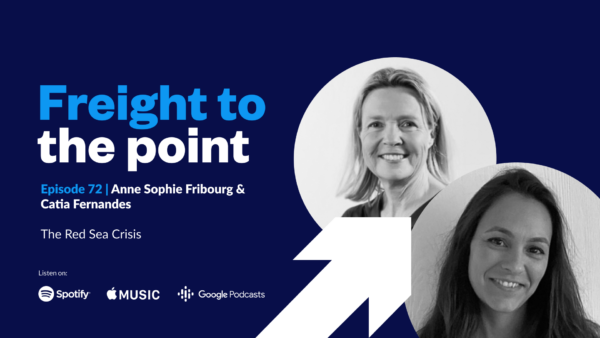
Episode 72: The Red Sea Crisis
In the latest episode of Freight to the Point, we’ve featured our most rec...
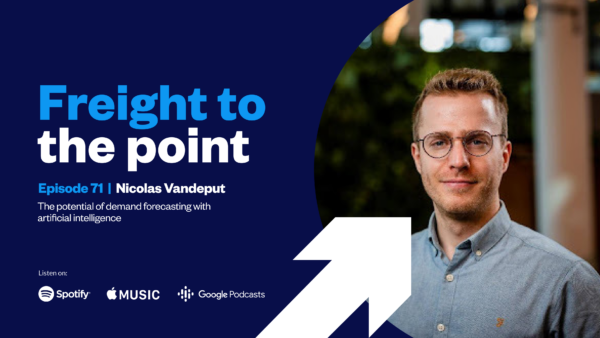
Episode 71: The potential of demand forecasting with artificial intelligence
In the most recent instalment of Freight to the Point, Lucie Phillips, Zen...
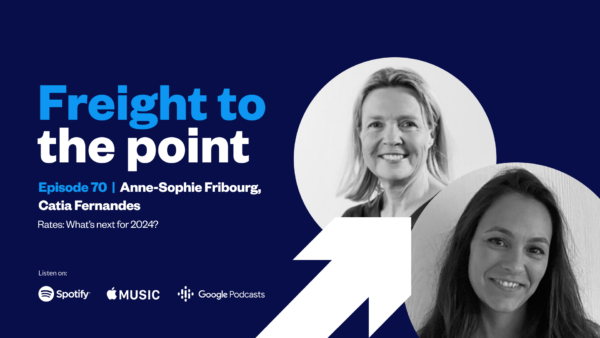
Episode 70: Rates: What's next for 2024?
As we prepare for the year ahead, it's crucial to consider the three pillars...

